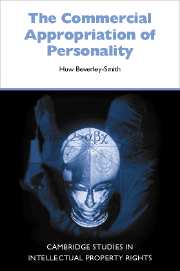Book contents
- Frontmatter
- Contents
- Preface
- Table of cases
- Table of statutes
- Part I A framework
- Part II Economic interests and the law of unfair competition
- 2 Introduction
- 3 Statutory and extra-legal remedies
- 4 Goodwill in personality: the tort of passing off in English and Australian law
- 5 Unfair competition and the doctrine of misappropriation
- Part III Dignitary interests
- Part IV Pervasive problems
- Part V Conclusions
- Bibliography
- Index
- Cambridge Studies in Intellectual Property
4 - Goodwill in personality: the tort of passing off in English and Australian law
Published online by Cambridge University Press: 07 July 2009
- Frontmatter
- Contents
- Preface
- Table of cases
- Table of statutes
- Part I A framework
- Part II Economic interests and the law of unfair competition
- 2 Introduction
- 3 Statutory and extra-legal remedies
- 4 Goodwill in personality: the tort of passing off in English and Australian law
- 5 Unfair competition and the doctrine of misappropriation
- Part III Dignitary interests
- Part IV Pervasive problems
- Part V Conclusions
- Bibliography
- Index
- Cambridge Studies in Intellectual Property
Summary
Introduction
At first glance, cases of appropriation of personality fit rather uneasily with the traditional notion of passing off. In its original, or classic, form the tort of passing off prevented a defendant from passing off his own goods as the plaintiff's goods, although the basic formulation was gradually extended to cover misrepresentations that the plaintiff's goods were of a different class or of a different quality from what they actually were. It also came to embrace cases ‘where although the plaintiff and defendant were not competing traders in the same line of business, a false suggestion by the defendant that their businesses were connected with one another would damage the reputation, and thus the goodwill of the plaintiff's business’. Thus a defendant was not entitled to carry on business in such a way as to lead the public to believe that he was carrying on the business of the plaintiff or that the defendant's business was connected with the plaintiff's business. In more modern times the tort has been extended further to cover cases involving the misdescription of goods, or the misuse of a descriptive term, if a trader can show that he is a member of a class and that a particular word or name has become so distinctive of that class's products as to make their right to use the word or name, truthfully in describing their product, a valuable part of the goodwill of each trader in that class.
- Type
- Chapter
- Information
- The Commercial Appropriation of Personality , pp. 59 - 110Publisher: Cambridge University PressPrint publication year: 2002



